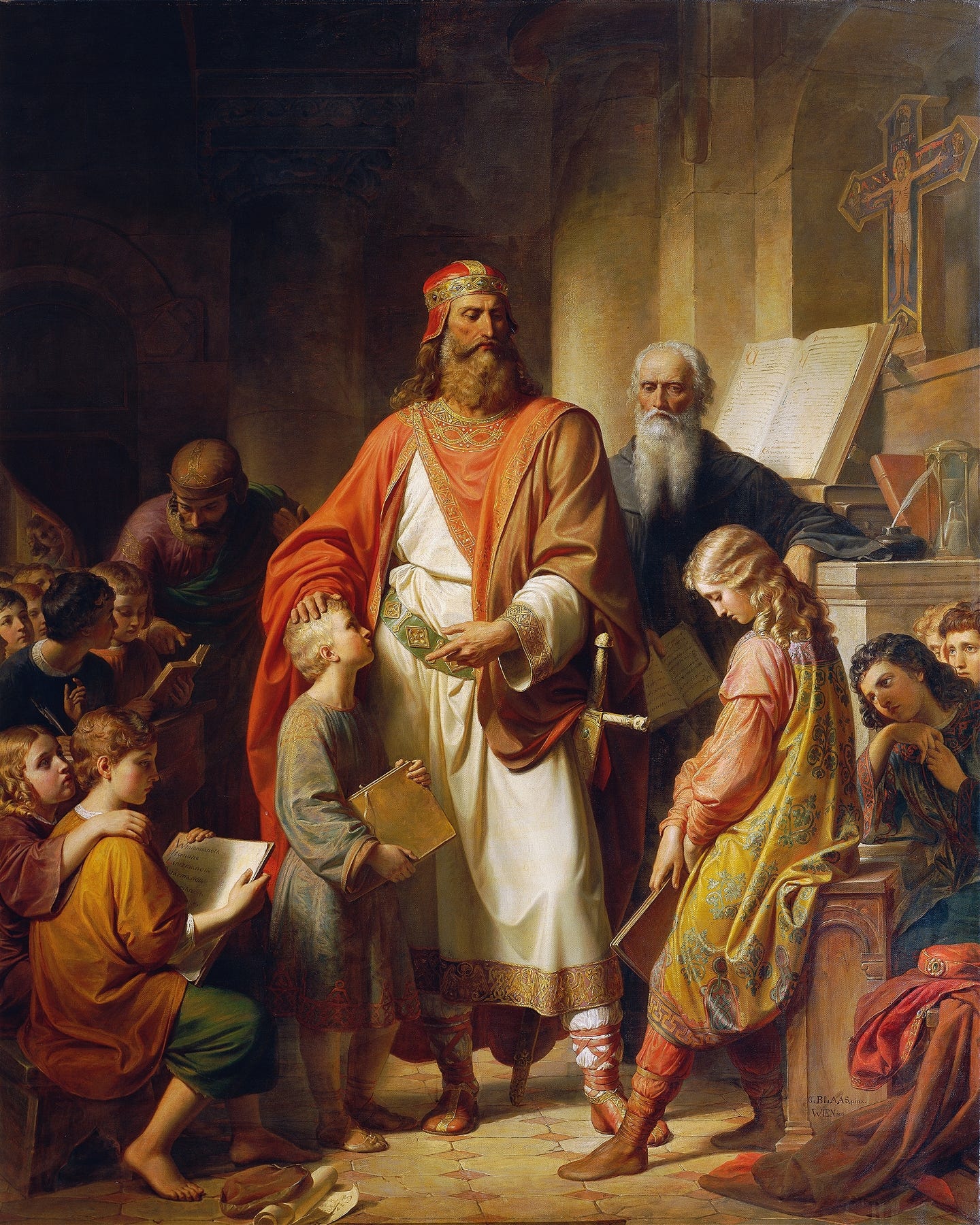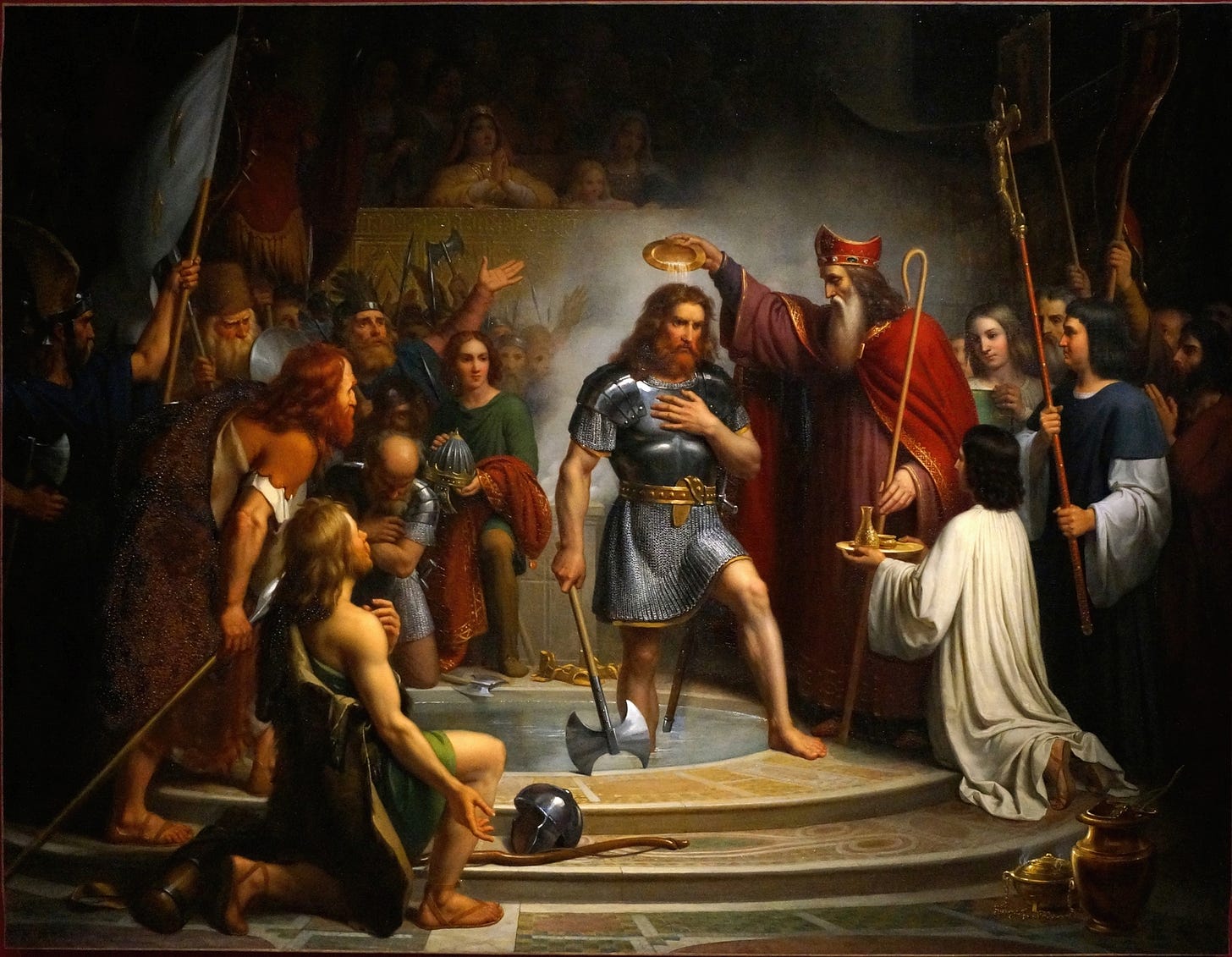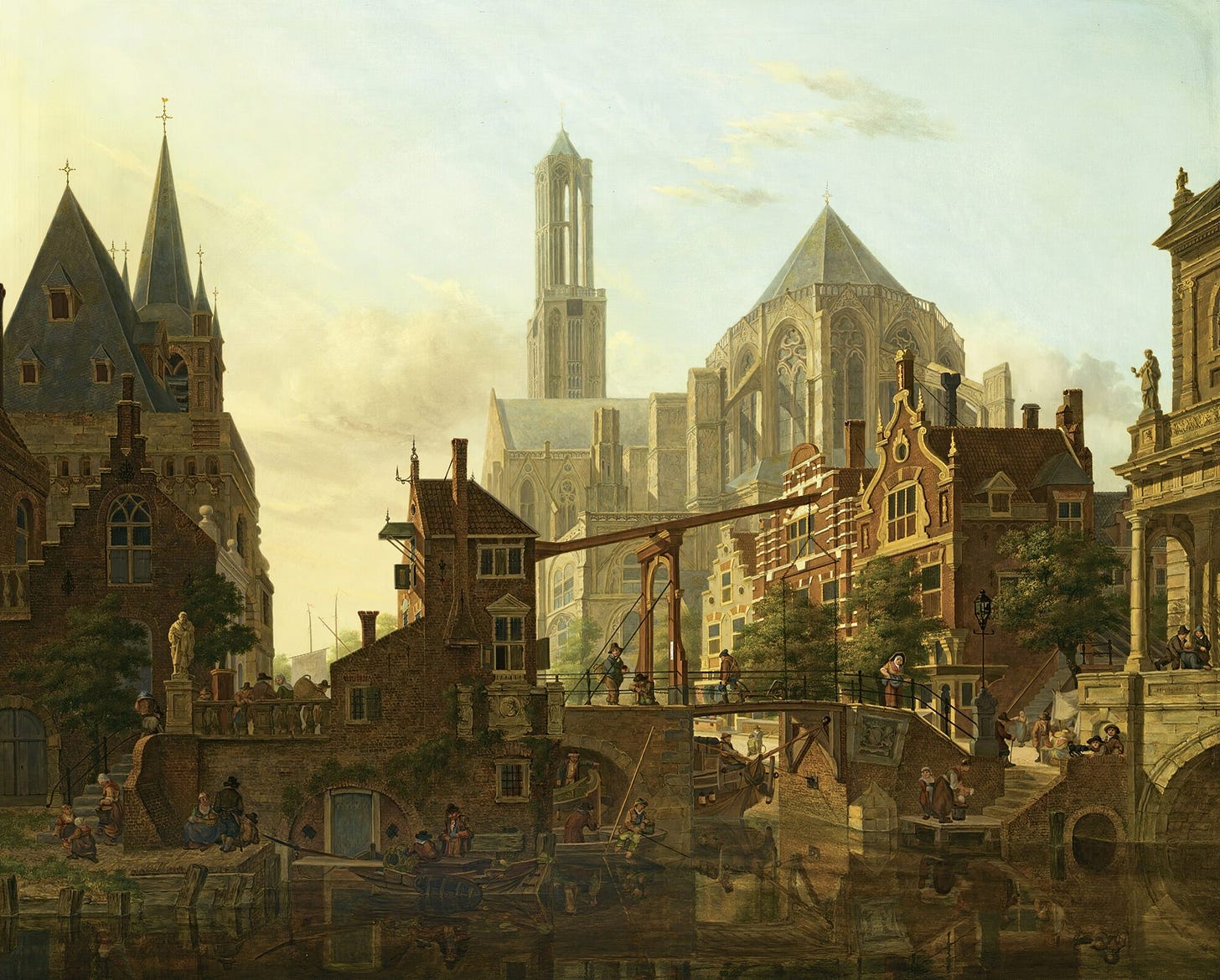The Frankish paradox
How to conquer the world but lose yourself along the way
By the time he had reached his final years, the Frankish king Charlemagne (AD 748–814) had achieved more than almost any ruler in the history of the world, having risen to become the most powerful monarch in Western Europe. He had even been crowned Emperor of the Holy Roman Empire by the Pope, cementing the Franks as the most successful of all the Germanic peoples who had rushed to fill the vacuum left by the fall of the Roman Empire in the West.
But Charlemagne was troubled — in conquering the world, the Franks were beginning to lose themselves. The Frankish language was already fading in much of his empire, as the Franks adapted to the languages of those they ruled. So, according to Eginhard’s Life of Charlemagne, the great king ordered that the ancient and “barbarous” songs of his people should be written down, and that a grammar of the Frankish language should be composed.
Tragically for history, Charlemagne’s son and successor, Louis the Pious, didn’t share his father’s concern for Frankish heritage — he banned the old pagan Frankish poems from being read or heard. If only Louis were as broad-minded a man as his father, we might have a Frankish equivalent to Beowulf or the Niebelungenlied. And the grammar, if it was ever completed, is lost to the sands of time.
Today, Frankish is among the most influential languages you’ll never be able to read. While Old English and Old French draw eager students hoping to read Beowulf or the Chanson de Roland, the Frankish language left us no great poetry — in fact, it left us no writing at all, at least none that has remained.
Nevertheless, the Frankish language casts a long shadow — and English wouldn’t be the same without it.
The Franks entered history in the 3rd century AD as a group of Germanic peoples living along the lower Rhine River who were occasional allies and frequent enemies of the Romans. Their fortunes rose in the world, however, and by the 8th century, under their king Charlemagne, they had built an empire that stretched across much of modern-day Germany and France (it’s called France because it’s the land of the Franks).
With dominion over such a great territory, you might imagine that Frankish would have developed into one of the world’s most widely spoken languages. But it was not to be — you see, when the Franks expanded into post-Roman Gaul (that is, modern-day France), they did not move in sufficient numbers to establish the Frankish language as the language of everyday people.
Instead, the version of Latin spoken by the locals continued alongside Frankish. Eventually, the Franks themselves adopted the local language, which had changed so much by this point that we can’t rightly call it Latin — it had become Old French.
Frankish lives on
But Frankish didn’t die out altogether. It was, however, dispersed over a wide geographic range, and ended up being spoken in regions with different political histories. Perhaps it was never a fully unified language, even during its heyday.
At any rate, in different regions, Frankish evolved in different ways. In the north, it comes into the written record as Old Low Franconian, which eventually developed into Dutch.
In the central regions, Frankish transformed into Old Central Franconian, whose descendants would later be considered dialects of German, or more specifically, High German. If you’re not familiar with the term High German, it’s just the name for the sub-family that standard modern German comes from.
How is it possible that some varieties of Frankish came to be considered Dutch and others came to be considered High German?
The answer rests on a technicality. One of the major features distinguishing High German languages from other Germanic languages is a sound change called the High German Consonant Shift.
Without going into too much detail, the High German Consonant Shift is the reason that German has Apfel and Zunge (with a ‘ts’ sound at the start), while English has apple and tongue. It just so happens that some of the Frankish dialects participated in this sound change while others did not.
The French connection
The Franks’ linguistic legacy can also be found in French, the language that still bears the name of the Franks.
While French is a Romance language, meaning that it was primarily derived from Latin, it bears the unmistakable marks of Frankish influence. As a result of this influence, French has become the most divergent — and just plain weird — of all the Romance languages.
When the Franks conquered Gaul (modern-day France), they brought their words along with them. Today, many French terms related to government, warfare, and social organization trace their roots back to Frankish. The French word guerre ‘war’? That's Frankish. Baron? Also Frankish. Even the word maréchal ‘marshall’ comes from the Frankish word marhskalk ‘horse-servant’.
The Franks' influence on French went far deeper than vocabulary. They fundamentally altered how French itself worked. For example, we can see Frankish influence in the modern French word on — used as an impersonal pronoun meaning “one” (as in on dit que... — “one says that…”). While the word on comes from Latin homo ("man"), its use as an impersonal pronoun mirrors Germanic patterns. Even today, German uses man as ‘one’ (as in man sagt… ‘one says’).
You speak some Frankish, too
Frankish also had an influence on English, through the particular dialect of Norman French that William the Conqueror brought to England in 1066. Normandy was (and still is) in the north of France, which was one of the areas where the Frankish influence on French was at its strongest.
This Frankish influence on English, though indirect, survives in words we use every day. Take the word guard, from Frankish wardōn (to watch over), which came to us through Old French guarder. Or consider lay when referring to a song or poem — it traces back ultimately to a Frankish word laik, which reached English through Old French lai. Our word blank, describing something white or empty, comes from Frankish blank “shining, white”, arriving in English by way of Old French blanc. When we say guide, we're using a word that began as Frankish wītan (to show the way), transformed into Old French guider, and finally made its way into English.
Sadly, we don’t have any Frankish texts to read today. What we know about Frankish largely comes from looking at the words it gave to Old French, or trying to wind back the history of Dutch. But Frankish is a fascinating (if enigmatic) language nonetheless, and it’s hard to understand the history of English without it.
Louis, why…
I must admit, I hold a little bit of a grudge against Louis the Pious. Imagine he hadn’t banned the singing of the old Frankish poems? We’d have a collection of heroic poetry written in Frankish from around the year 800! Not only would we know a lot more about the Frankish language, but these works might shed some light on the events of the other early Germanic poems.
Not least among these would be Beowulf — after all, the Franks are mentioned in Beowulf as the enemies of Beowulf’s people, the Geats. Beowulf’s uncle Hygelac died fighting the Franks — as the poem tells us, his life went in francna fæþm ‘into the embrace of the Franks,’ as did a rather nice piece of jewellery.
Wouldn’t you like to hear the Franks’ side of the story? I, for one, most certainly would.









I'd check out some of Arend Quak's publications on Frankish. He's analysed the language of the glosses to the Salic law and its different from both Old Low Franconian and High Franconian in several ways.
thanks for the article. But I'm not sure that I would assume that military conquest would lead to linguistic dominance. Except in Britain, Romance languages dominated Western Europe even after the decline of the empire and domination by other, non-Latin speaking leaders. Conversely, while descendants of Latin "won" in Western Europe, Latin never pushed out Greek in the Eastern Mediterranean. Or you can think about the continued use of Aramaic even after the rise of the Persian empire.